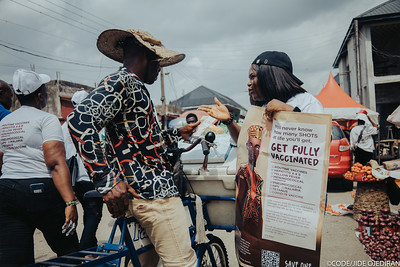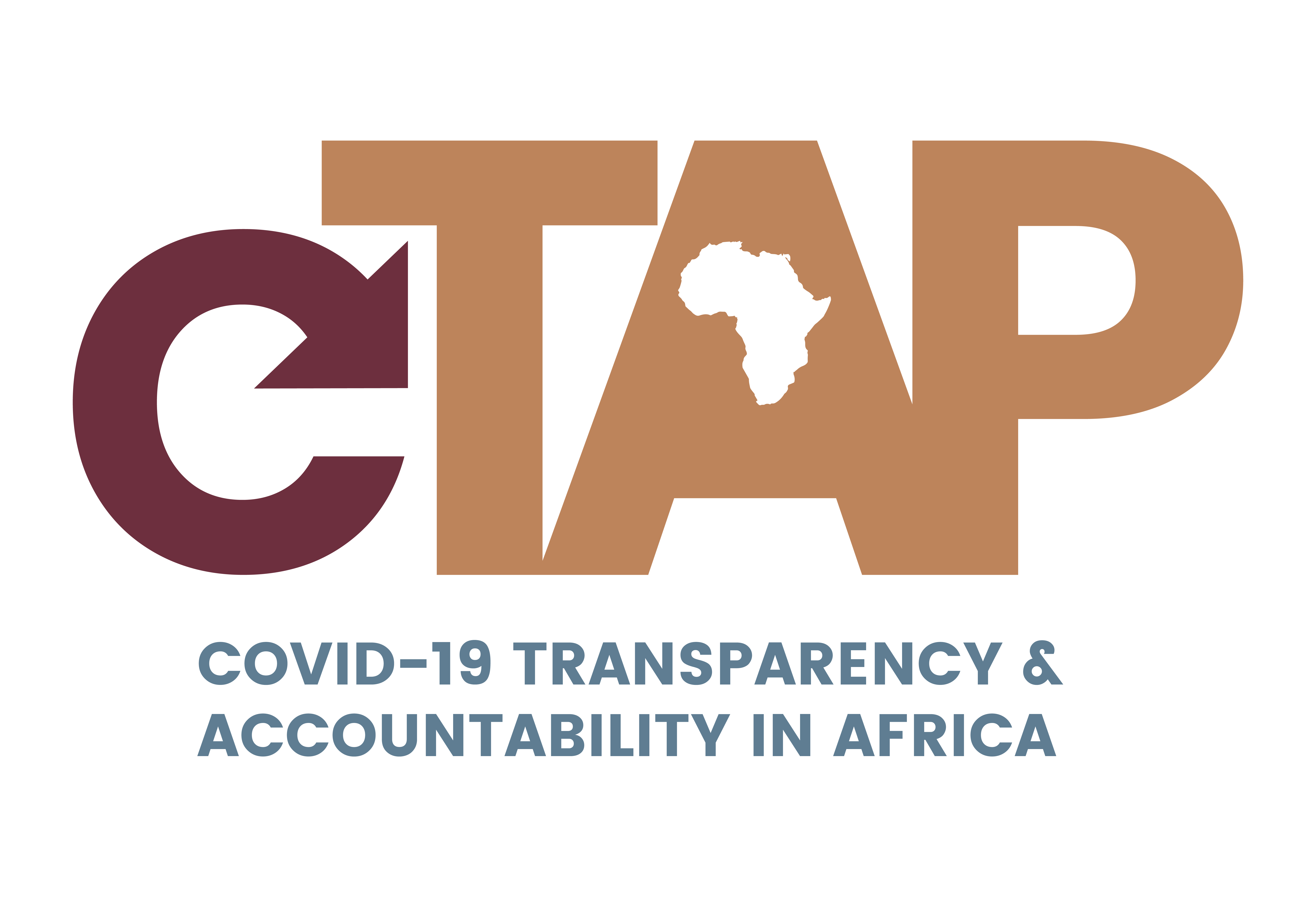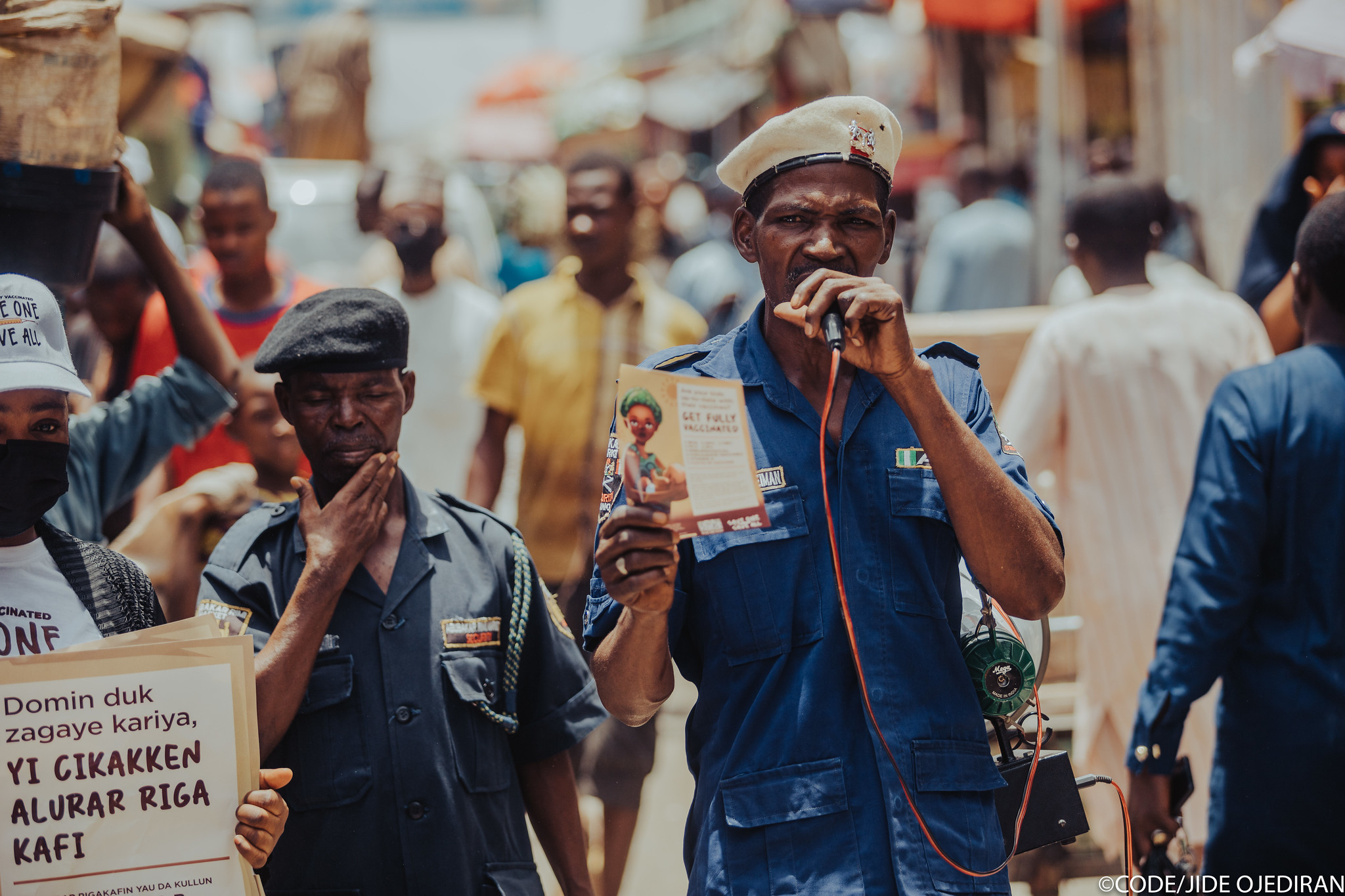“If you eat Tuwon Daya Maikuka, nothing go catch you. Even Corona no go catch you. You can ask Doctor, me I eat that one that is why I don’t need they vaccine ” – Idris, Trader.
By Nancy Odimegwu
Despite vaccines’ status as one of the most effective public health initiatives in recent history, their acceptance rate remains low in many nations, and Nigeria is no exception. Despite the availability of vaccines for many diseases, there is considerable reluctance toward vaccination. As a result, vaccination rates in Nigeria have remained significantly lower than they should be. This resistance can be ascribed to a number of issues, including but not limited to misinformation, a lack of trust in the government, and religious views.
This may be seen in the number of Nigerians who have received the full course of the COVID-19 vaccine, which protects against a virus that has been circulating in the country since 2020. Of Nigeria’s 210 million people, the National Primary Health Care Development Agency, NPHCDA, estimates that 64 million have taken the full dose and 12 million have taken at least one. Also, about 160 million of Nigeria’s estimated 206 million people were in danger of contracting Yellow Fever as of August 2022, according to the World Health Organization, to mention a few.
Beginning with an in-depth conversation with Community Health Care Workers in the states of Akwa Ibom, Bayelsa, Cross River, Delta, Edo, and Rivers, the South-South Activation of #SaveOneSaveAll continued with a market sensitization and concluded with a campus visit over the course of three days.
CTAP Project Lead for BudgIT Iyanuoluwa Bolarinwa stressed the importance of health workers actively dispelling the myths and misinformation that have contributed to vaccine hesitance and unequal distribution during the dialogue session, an argument that was corroborated by citizens’ reactions and comments the following day during our visit to Umuokoro market
“Dem talk say the COVID na for ndi nnuku (rich people). Say na those ones dey catch am, me like this i no see money, so no worry, I no dey the category.” As expressed by Mama Nkem, a Trader.
What are the issues? Vaccine skepticism in Nigeria is exacerbated by widespread misinformation. Misinformation claiming vaccines are unsafe and can cause autism, infertility, and other health problems has circulated widely online and offline. Vaccines have been met with skepticism from those who think they may cause more damage than good. Fear and distrust have spread throughout the public as a result of these erroneous assertions, making it more challenging to encourage individuals to be vaccinated.
A Trader, Esther, told us at our third #SaveOneSaveAll campaign stop in Port Harcourt, Rivers’ Umuokoro Market, that she was just afraid to get the COVID-19 vaccine.
“Me I am just scared of taking the COVID-19 vaccine. There’s something about getting the vaccine that I just can’t bring myself to do.” She said.
We were taken aback by Idris’, an onion dealer’s explanation for why he has yet to get the COVID-19 vaccine. Idris claims that avoiding infection can be as simple as eating a certain type of Nigerian food on a regular basis.
“If you eat Tuwon Daya Maikuka, Nothing go catch you. Even Corona no go catch you. You can ask Doctor, me I eat that one that is why I don’t need they vaccine.” He stressed
Vaccine uptake is hindered not only by false information but also by people’s general distrust of the government. Due to the government’s well-documented history of corruption and ineptitude, many Nigerians no longer have faith in it. The government’s lack of openness concerning vaccine safety and effectiveness has made some feel that vaccination is neither necessary nor beneficial but rather a tactic of coercion. This widespread mistrust has made health professionals face an uphill battle in persuading the public to be vaccinated.
“This sensitization you are doing is just a waste of time!. There is no COVID-19, the government is just saying there is so they can use it to collect enough money from the international community. Even the one that they have collected, how did that benefit me? Are you people not ashamed?!” Mama Tina yelled.
“See ehn. Corona no dey. E no dey, no dey tell me rubbish. How many people you know wey don catch am? Tell me at least one person wey you know personally wey don catch the virus. I dey tell you say he no, you dey talk another thing.” Chima chanted as he passed the campaign station in Port Harcourt.
The beliefs and perspectives of state actors and leaders also make up the cluster. Vaccines are controversial because some people feel they go against their religion or culture. Vaccination has been met with opposition from some religious leaders who say it goes against their faith’s precepts. Further complicating the task of health officials is the fact that people tend to remember the views of governmental actors who have spoken out against vaccines.
“Corona no dey. My Governor talk am say e no dey. For my state – Kogi, my governor don talk am say COVID no dey. E fit dey Nigeria o, but you see for Kogi, e no dey at all at all. So if e no dey my state, why i go come take am.” He made his point quite well.
Apart from the common misconceptions, beliefs, and misinformation, health workers also face a number of challenges that hamper vaccine distribution in Nigeria. During the community healthcare workers’ dialogue, they blamed the region’s rising vaccine skepticism on a lack of proper remuneration and worker welfare. They demanded proper payment or no vaccine shots. The message was clear: “No payment, no vaccination.”
Even if the government is making strides to solve the issues being raised by the workers, sufficient compensation and welfare remain a challenge, as stated by Christopher Ogbointuwei, the Executive Secretary of the Bayelsa Primary Health Care Board.
Where do we go from here? The government of Nigeria can take numerous measures to improve vaccination understanding and uptake.
If we take the adage “Health is Wealth” at face value, then prosperous countries are those whose governments prioritize the health of the population. Therefore, the government should enhance funding for vaccination awareness programs. To keep the public healthy, knowledge of vaccines’ efficacy and necessity is crucial. In order for people to make educated decisions regarding vaccination, we must spread accurate information about vaccines, including their track record of safety. Therefore, the government should spend money on public education to raise awareness of the significance of vaccines and dispel any myths or misinformation about their safety and efficacy by providing accurate information from reliable sources like medical professionals and government websites like the Nigeria Centre for Disease Control (NCDC). The use of radio, television, and community outreach initiatives can also help with this. Meanwhile, health professionals must collaborate with influential members of the community to disseminate factually correct information regarding vaccines.
Vaccine availability must not be a problem. Vaccination sites where people can get their shots without making an appointment or waiting in huge lines must be readily available to the public. Mobile clinics could be used to offer healthcare to underserved areas of the country. For this purpose, the government should expand the number of vaccination facilities, enhance the distribution network, and provide free or subsidized vaccines to low-income households so that no Nigerian is excluded from receiving the vaccines they need.
Does it seem reasonable to argue that people no longer have faith in their government? Corruption and poor management in Nigeria’s government are old tales that have been passed down through the generations. The first step is to take concrete steps to dispel this misconception and restore faith among the public. The government should make an effort to gain the confidence of citizens who are reluctant to get vaccinated. Community leaders, religious leaders, and other influentials can help by spreading the word about the importance of vaccination.
Vaccination requirements might need to be expanded to include schools. Getting vaccinated before going abroad is now required. The same should be true for students (undergraduates). One way to increase vaccination rates is for universities to require vaccinations as part of new students’ health screenings. This will unquestionably boost vaccination rates and slow the spread of disease. The government should also track the percentage of the population that has been immunized in order to pinpoint areas with low vaccination rates, such as rural communities. This allows for tailored vaccination distribution.
It’s true that vaccines are crucial to public health, but getting people to actually use them is difficult. It is pertinent for citizens to understand the importance vaccines play in preventing the spread of diseases and maintaining public health. This is what the CTAP #SaveOneSaveAll campaign is set to correct.
The message is clear, Get fully vaccinated. SaveOneSaveAll.
This project is supported by the Hilton Foundation.


